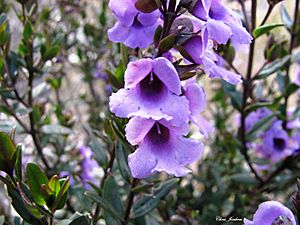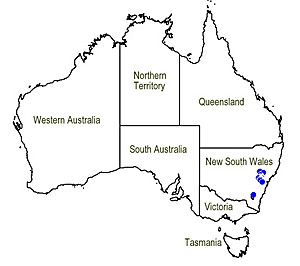Prostanthera hindii facts for kids
Quick facts for kids Prostanthera hindii |
|
|---|---|
 |
|
| In the Wolgan Valley | |
| Scientific classification | |
| Genus: |
Prostanthera
|
| Species: |
hindii
|
 |
|
| Occurrence data from AVH | |
Prostanthera hindii is a special kind of flowering plant. It belongs to the Lamiaceae family, which includes mint plants! This shrub is only found in the Central Tablelands area of New South Wales, Australia. It's a small, upright bush with fuzzy branches. It has egg-shaped leaves and pretty mauve flowers. The inside of its flower petals can be a deep mauve or even dark purple.
Contents
Discovering the Prostanthera hindii Plant
Prostanthera hindii is an upright shrub, meaning it grows straight up. It usually reaches a height of about 0.3 to 1 meter (about 1 to 3 feet). Its branches are covered in tiny hairs and small glands. These glands make the branches feel a bit sticky.
Leaves and Flowers of Prostanthera hindii
The leaves of this plant are dark green on top and lighter underneath. They are mostly smooth and shaped like an egg. Each leaf is about 15 to 25 millimeters long and 4 to 8 millimeters wide. They grow on a small stem called a petiole, which is 1 to 2 millimeters long.
The flowers grow one by one in the upper parts of the plant, near the leaves. At the base of each flower, there are small leaf-like parts called bracteoles, about 3 to 5.5 millimeters long.
The sepals, which are the green leaf-like parts that protect the flower bud, are maroon. They form a tube about 2.5 to 3 millimeters wide. This tube has two lobes, or sections. The lower lobe is about 4 millimeters long and wide, and the upper lobe is about 5 millimeters long and wide.
The petals are mauve, a soft purple color. They are 10 to 14 millimeters long and form a tube about 5 to 7 millimeters long. Inside this tube, the color is a deeper mauve to dark purple. The bottom middle part of the flower is shaped like a small spoon, about 5.5 to 6.5 millimeters long and 4 to 6.5 millimeters wide. The side parts are 5 to 5.5 millimeters long and 4 to 5 millimeters wide. The top part is broadly egg-shaped, about 5 millimeters long and 7 millimeters wide.
This plant mainly blooms from spring to early summer.
Naming the Prostanthera hindii
This plant was officially named Prostanthera hindii in 1997. It was described by a scientist named Barry Conn in a science journal called Telopea.
Why is it Called hindii?
The second part of its name, hindii, is a special way to honor someone. It was named after Peter Hind. He helped Barry Conn collect the very first samples of this plant. These first samples are called the type material, and they are used to define the species.
Where Prostanthera hindii Lives
This mint bush grows in a specific type of forest. It likes Eucalyptus woodlands, which are forests mainly made up of eucalyptus trees. These woodlands also have many shrubs growing underneath the trees.
This plant is only found in the Central Tablelands region of New South Wales, Australia. This means it is endemic to that area and doesn't grow naturally anywhere else in the world.

